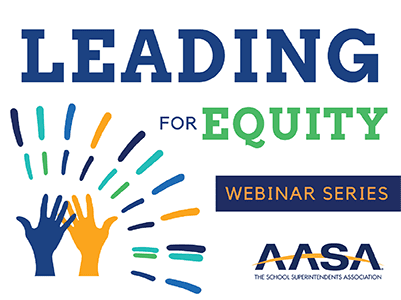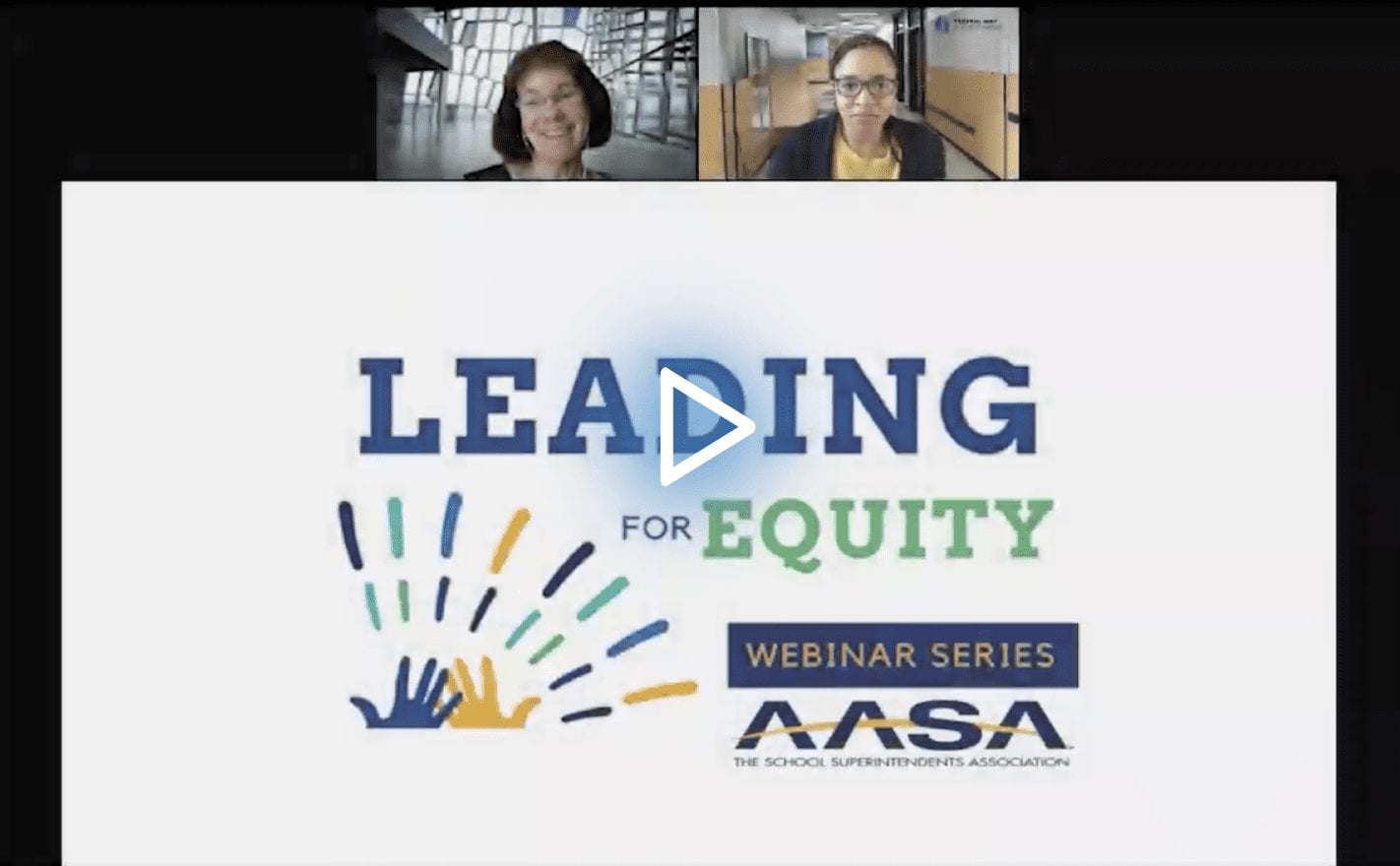Building a System of Equity Across School Districts
By Stacey Pusey
According to Dr. Tammy Campbell, Superintendent of Federal Way Public Schools (WA), working towards equity requires using the head and the heart. School leaders need to have the skills and understanding to understand and change educational systems, she said, but they must also have a passion for their community and the equity mission.
During a recent edWebinar, hosted by AASA, The School Superintendents Association and AASA’s Leadership Network, Dr. Campbell explained how her district stays focused on ensuring equitable access for all students.
First, equity begins with making sure everyone in the community, from the superintendent to the bus drivers, is aligned with the equity vision, and it must be driven by students’ needs and outcomes. At Federal Way, the goal is for all kids to see themselves positively in their learning and be ready for college and career success. Once they understood what the students needed, they worked backward to see what training, policies, and programs are needed, e.g., what do the teachers need to help the students achieve, how can the principals and administrators support the teachers, and what do the administrators need from the district and the school board?
Next, equity must drive the district’s strategic plan. In the Federal Way plan, there are five strategic goals, and each school must adopt at least two of the goals and provide regular updates on their progress. Dr. Campbell explained all of the schools must be aligned to the same equity goals because there is no greater friend to the opportunity gap than variability and siloed approaches. When schools offer inconsistent approaches to equity, the well-resourced families will take advantage and continue to get more while the other families are left behind.
Furthermore, all of the metrics for success in the strategic plan relate to student outcomes. Principals must disaggregate their data and analyze programs’ impacts through four lenses: growth, consistency, equity, and standards. Similarly, all of the district departments must complete work plans, which in addition to other information, answer how the work will further the equity agenda. They share these reports three times a year and discuss what progress they are making toward their goals.
In order to create a school community aligned to equity, equity must also be a factor in the hiring process. In every job description, equity and anti-racism are listed as expectations for the position. Every candidate is asked questions related to their work with and views on equity. Finally, the hiring panel is comprised of community members who reflect the values of the district, including students.
In fact, the Scholar Voice is the key component of all equity work in Federal Way. Dr. Campbell noted many districts say they ask for student input, but in her district, leaders ask Scholars to evaluate the schools, their progress—or not—towards equity, and what the students need to be successful. And, most important, they act on what the students say. For instance, the district has been reviewing the curriculum, with input from their Scholars, to make sure the curriculum reflects the student body and the students can see themselves in their learning. There are also Scholar representatives on the school board who gather and share information from students at all of the schools.
Dr. Campbell acknowledged some departments, like transportation, weren’t sure at first how equity fit with their work. That’s why professional development is so important. Constant, consistent training about equity and each staff member’s role in working towards that goal is essential. Moreover, even training that isn’t specifically about equity should have an equity component. By including equity in every conversation, Dr. Campbell and her team are creating a system hardwired to support their mission.
This edWeb broadcast was hosted by AASA, The School Superintendents Association and AASA’s Leadership Network, providing premier professional learning for educational leaders.
About the Presenter
Now in her sixth year as Superintendent of Federal Way Public Schools (FWPS), Dr. Tammy Campbell has led the district in positioning its scholars to seize very bright futures. Under her leadership, FWPS has realized both regional- and state-level accolades with the FWPS School Board of Directors named as the Large District Board of the Year by the Washington State School Directors’ Association, and Dr. Campbell having been recognized as one of the 25 most influential leaders in the Seattle Region by Seattle Magazine.
However, her most impactful achievements include:
- Graduation rates have increased for the last eight consecutive years, currently at 88.2% for the class of 2020. This includes significant narrowing of graduation gaps for scholars of color.
- FWPS has received regional recognition for college-going rates and attainment.
- As the most diverse district in the state, FWPS has some of the highest numbers of scholars enrolled in advanced placement courses and those who persist in college during their second year.
- Scholars in Career and Technical Education (CTE) courses are earning industry-recognized certifications and are participating in field trips and internships offered at Microsoft, Boeing, STEM companies, and more.
- Scholar Voice as a ubiquitous lever at all schools including every principal meeting with their scholar advisories every month to examine data, elicit strategies, and gather feedback on continuous improvement.
- In 2017, the community supported the passage of an unprecedented bond package of almost half a billion dollars—the largest bond measure in FWPS history and one of the largest in the region.
- A systems approach to racial equity where EVERY staff member engages in professional learning on dismantling systems that close doors for scholars of color and other scholars who are furthest away from educational justice—FWPS has a culture where they lead for equity throughout the organization.
Dr. Campbell’s upbringing as a young girl in the Louisiana Delta, in a time of de facto segregation, convinced her that schools are “game changers” for students and communities. That awareness led her to accomplish many firsts in her family including high school valedictorian, first college graduate, and first to receive her doctorate. At every milestone, she would reflect on her journey and the key people who lifted her toward her dreams. Almost always without fail, they were teachers who lifted her up and believed she could do incredible things. Dr. Campbell began her career in education as a classroom teacher and brings over 21 years of experience to her role as Superintendent of Federal Way Public Schools. She has served as a principal, executive director of teaching and learning, executive director of instructional programs, assistant superintendent of teaching and learning, and higher education faculty.
About the Moderator
Dr. Valerie Truesdale joined AASA early in 2019 as the assistant executive director responsible for guiding leadership development services and programs. With years of experience in the superintendency and roles in instructional technology, she knows that AASA’s Leadership Network can be a substantial resource for school leaders trying to keep pace with the rapidly changing delivery of K-12 education.
Join the Community
Leading for Equity is a free professional learning community on edWeb.net for school and district leaders who face many challenges leading schools and driving school improvement for all students, especially now with COVID-19.
The AASA Leadership Network drives superintendent success, innovation, and growth, shaping the future of public education while preparing students for what’s next. We are the largest, most diverse network of superintendents in America. Passionate and committed, we connect educational leaders to the professional learning, leadership development, relationships, and partnerships they need to ensure a long career of impact.
Stacey Pusey is an education communications consultant and writer. She assists education organizations with content strategy and teaches writing at the college level. Stacey has worked in the preK-12 education world for 20 years, spending time on school management and working for education associations including the AAP PreK-12 Learning Group. Stacey is working with edWeb.net as a marketing communications advisor and writer.






Comments are closed.